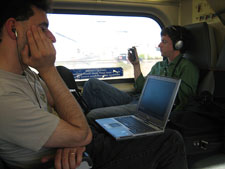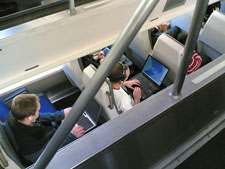Every two weeks, MPC uncovers best practices from around the world and delivers them right to your inbox in Talking Transit. This week, MPC explores wireless internet connectivity on trains, in stations, on boats, and in terminals.

Photo courtesy of Ben Margolin
Wireless internet technology, more commonly known as Wi-Fi, has become a staple in bookstores, coffee shops, and even airports around the globe. People can log onto wireless connections at various “hot spots” and have immediate access to the online world. These connections have worked well at fixed locations, but what about accessibility on a moving train? It may be more common than you think.
In 2003, a train en route from Sweden to Denmark became the first to provide Wi-Fi service. London, Dallas, and San Jose, Calif. are among cities testing and implementing Wi-Fi variations on their commuter train routes. Most systems charge an hourly, daily, or monthly rate, and Boston is the first in the U.S. to provide the service for free.

Wi-Fi on rail has several benefits. Aside from providing a more productive and pleasurable environment for long-distance travelers, being connected to the Internet on commuter routes is an incentive that helps agencies attract new riders to transit. The Boston T spent $1.38 million to implement the service on all of its commuter rail lines, but saw the service as a solid investment to attract and keep riders for the future. Officials estimate that if only 300 new riders purchase monthly passes for a year, the service will have paid for itself. And, as more people choose to ride the train instead of drive, the effect is reduced congestion and pollution from declining car traffic.
Wi-Fi on trains also provides a unique sense of flexibility. For example, the University of Phoenix provides working adults access to higher education by allowing students to learn online at times and places of their choosing. In 2007, the University of Phoenix entered into a marketing partnership with San Jose’s 86-mile commuter line, the Altamont Commuter Express (ACE), to promote Wi-Fi amenities so that students could take online courses during their morning and afternoon commutes. While critics have noted that personal interactions are less likely to occur with people glued to laptops or cell phones, riders have, for the most part, embraced the added value from Wi-Fi.
 Not only are commuter trains getting the added Wi-Fi amenities, but so are buses, boats, stations, and terminals. Because of the success on the Massachusetts Bay Transportation Authority’s pilot with Wi-Fi on the train, the free service was recently extended to the commuter boat system. To date, 11 commuter boats are equipped with Wi-Fi technology. In Paris, access to a Wi-Fi network is available to municipal bus riders along the #38 route. Drivers are able to get up-to-the-minute information from their headquarters or obtain traffic reports from their news outlet. The service also allows drivers to alert police when cars are parked in bus lanes or they encounter other violations that interfere with their routes.
Not only are commuter trains getting the added Wi-Fi amenities, but so are buses, boats, stations, and terminals. Because of the success on the Massachusetts Bay Transportation Authority’s pilot with Wi-Fi on the train, the free service was recently extended to the commuter boat system. To date, 11 commuter boats are equipped with Wi-Fi technology. In Paris, access to a Wi-Fi network is available to municipal bus riders along the #38 route. Drivers are able to get up-to-the-minute information from their headquarters or obtain traffic reports from their news outlet. The service also allows drivers to alert police when cars are parked in bus lanes or they encounter other violations that interfere with their routes.
To reduce congestion, air pollution and wasted time and fuel, transit needs to provide a reliable and comfortable service so people leave their cars at home. The productivity, accessibility and convenience of a Wi-Fi network on transit helps to make transit an even more attractive choice.
This article was featured in Talking Transit, MPC's bi-weekly e-newsletter. To receive the newsletter, visit http://www.metroplanning.org/personalize.asp.